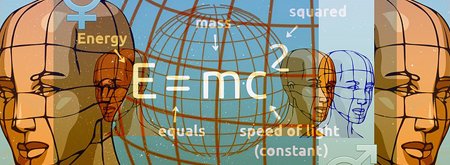Studying ... Physics?
So what do you study? Physics! What a conversation stopper! You can see the stereotypes go through their mind. In fact you may see many of those stereotypes in yourself or fellow students and almost certainly in some of your lecturers! As a Christian you seem to be a 'weirdo' amongst your fellow physicists. While as a physicist you seem to be a ‘geek’ amongst your non-physicist friends.
Physics has got a reputation for being a hard subject. Right now you may feel that physics is easy although there will probably come a time in your course when you face a topic that makes your brain really hurt! But let's be honest, it's those moments of finally understanding some counter-intuitive, abstract, mind-boggling aspect of the world that makes physics fun. As a Christian how do you deal with those frustrating times of not understanding what on earth your physics problem sheet is on about? One thing I found very hard as a student and am still trying to learn is to have the humility to ask others for help and the grace to help others in a way that builds them up rather than puts them down. As 1 Corinthians 8:1 puts it: "Knowledge puffs up, but love builds up." Physics can become a pretty competitive environment with everyone trying to prove how clever they are and it's a real challenge to be different.
Physics and Faith
Do you struggle to integrate aspects of Christianity with science? Do you have physicist friends who challenge your Christian beliefs and/or Christian friends who challenge your scientific beliefs? Sometimes it can feel like we're alone in having such a combination of beliefs that some people think are incompatible. I did a lot of thinking and grappling with such issues as a student and I still do. There are many tough questions about creation, God's interaction with the world, miracles, free will and predestination, etc. that can be problematic for us and there aren't easy answers. I'd like to encourage you to question, to explore, to discuss, to dare to doubt. I pray that God will guide you through such journeys to strengthen and deepen both your faith in him and your wonder at his creation. For me, being a Christian and a physicist have always gone together. I chose physics because I was fascinated by God's creation and by trying to understand how it works. My faith has given me the motivation and strength to try to tackle this challenging subject and the more I discover about the world through physics the more I am moved to worship our creator.
Hanging around physicists, I am often surprised how interested and open people are, even those who seem on the surface quite anti-religion. Even in the physics press, e.g. the Institute of Physics' magazine, Physics World, there are sometimes articles touching upon science–religion issues. A Christian physicist friend of mine once said "there are lots of physicists who are Christians – I think it's because if you can believe physics you can believe anything!" One has to admit there are aspects of modern physics that do seem to require a bit of a 'leap of faith' to accept! To take a metaphysics example: is it really easier to believe in multiple universes than a moment of creation? Many of my non-Christian physicist friends and colleagues accept that things like this are a choice of faith. Your non-Christian friends may not admit it, but many of our scientific theories are based on fundamental assumptions that, if traced back, at some point require us to just accept/believe.
The Limits of Physics
As scientists it's important that we remain open to new experimental evidence, improved theories and new discoveries that require us to rethink our pre-accepted concepts. It's exactly this combination of believing a theory as the best current understanding while remaining open to that same theory turning out to be wrong or incomplete that produces progress in physics research. It's by making assumptions and testing them that we move closer, step by step, to understanding the world around us. Is our Christian faith really very different? Is that not also based on the same kind of combination of beliefs and openness to correction due to new evidence from our experience of life, reading of the Bible and revelation that produces progress in our journey of faith?
Like many physicists, I am a ‘critical realist’, which means I believe there is a real world out there that we're able to study; but that our understanding of it is, and will always be, partial. I believe progress in both scientific research and our understanding of God gradually draws us closer to that reality out there, but that we will never fully reach it because our finite human minds are not capable of fully grasping and understanding the world around us and its creator God. Modernism put science on a pedestal that most scientists recognise is undeserved. Many people in our society think that science has explained, or will explain, everything and that therefore there is no need for a belief in God. However, scientists on the 'inside' are often more likely to recognise the failings of science. Those of us working in physics research see how easily human error can enter into the scientific method. Also, the more we find out, the more questions arise. The more I find out about physics, the more I realise just how little I know. As scientists we know that science cannot explain everything and this leads many to openly consider God.
Postmodernism does not satisfy physicists in general who tend to be realists, i.e. they believe that there is a reality out there (therefore it's worth getting out of bed and studying it!). The popular postmodernist arguments of "it's true for you but it's not true for me" don't make so much sense to physicists who believe that there is one truth we're all studying and if an experiment is not reproducible it's not reliable.
Challenges and Integrity
Over the years I have had many fascinating conversations with physicist friends and colleagues about religion. I'm the kind of person who enjoys such discussions, especially with people who have different opinions to me. I've learnt so much from such exchanges of views.
Strangely, sometimes I feel more alien amongst Christians discussing scientific issues than amongst physicists discussing religion. I have met many Christians who hold opposing views to me when it comes to issues such as creation.
Interpreting the Bible is an important and difficult task, which we engage in every time we read the Bible. Personally I don't take a very literal interpretation of the beautifully and poetically written creation stories in Genesis and descriptions in Job, Isaiah and Psalms. Therefore, for example, I don't have a problem with believing that God created the world with a big bang and that the evolution of the stars and planets took a lot longer than six days.
However, I have met many creationists who think this interpretation is too liberal. Whatever your views are, I'm sure you also meet people with different views. When it comes to debates about creation the most important thing to remember is what we all agree on as Christians – that God made this amazing world we live in and why he did. How he did it is just details. However, what our non-scientist friends sometimes don’t understand is that for some of us physicists these 'details' are important to us. We crave integrity in our lives and want our scientific and religious beliefs to be compatible and make sense. For many Christians what they believe about, for example, creation makes no difference to their faith, but for some physicists it makes the difference between Christian faith or atheism. For us it's therefore a challenge to root ourselves in the grace of God to accept Christians who hold different views from us.
It is refreshing for some people to realise that it's not necessary to be a creationist to be a Christian. Some physicists would deep down like to believe in God but think it's kind of a package deal with bits in it that they cannot accept. When I discuss my beliefs with a non-Christian friend I try to show them that it is possible for me to rationally be a scientist and a Christian.
In my experience, studying physics as a Christian is a journey of discovery that can be tough but is exciting as God is with us and shows us more of himself as we try to comprehend his creation.
Recommended Books
John Polkinghorne (my hero!) e.g. Science and Theology (Augsburg Fortress, 2006); Quarks, Chaos and Christianity (SPCK, 2005).
Ernest Lucas Can we believe Genesis today? The Bible and the questions of science (IVP, 2001).
David Wilkinson God, Time and Stephen Hawking (Monarch, 2001).
Recommended Organisations
Christians in Science
Many resources and book suggestions can be found on their website.
The Faraday Institute for Science and Religion
Audio and video recordings of past courses and seminars can be found on their website.
© 2008 Rhoda Hawkins



